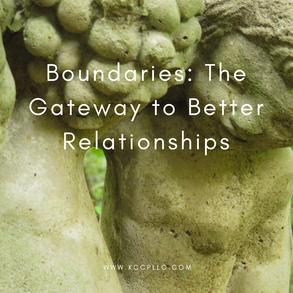|
Boundaries are more than just ways to divide the earth into countries, states, and towns; they signify so much more than dividing lines on the planet. They are invisible lines used to set parameters for how we desire to form relationships throughout our lives. What is the whole big deal regarding boundaries anyway? Why are people writing books on maintaining appropriate boundaries and facilitating relationships? Shouldn't all of this be second nature? Of course, you don't hug someone when they don't want a hug, and if you call someone and they are busy, you don't call back five minutes later to try to chat again. In counseling, we talk about boundaries as they connect to codependency when you need constant reassurance from someone else before making decisions. Other factors make it challenging to live a confident life. Boundaries make a lot of sense if you receive too much emotional or physical attachment from another person. Well, you least know what you like and what you do not like about another person. How often have you heard someone say, "they just do not have healthy boundaries"?
You can teach healthy boundaries by showing proper emotional attachment as a parent, which means you have to take your own boundaries inventory. Are you making sure to demonstrate healthy passions in your own life by the amount of affection shown to your significant other and other family members and how you handle arguments? You can encourage children to maintain healthy boundaries by watching how they attach themselves to other children. Are they hugging too much and not stopping when another child tells them to stop? Are they seeking out friends by offering rewards for their friendship? As parents of teenagers, they need to be taught healthy boundaries with a little bit of autonomous love, which can be difficult for parents in a world dominated by social media to decide what limitations are best for their mental, emotional, and physical well-being. Parents must remember that they will push boundaries and that this is normal for increasing autonomy. Teenagers do this because they are learning how to become adults. Unfortunately, to the dismay of many parents, it is up to you to reprimand children and explain the reason for a curfew or why they cannot hide who they are spending their time with. Remember that it is essential that you describe yourself to your children as opposed to the adage, "you don't need to know why. I am the parent, and I say so". As adults, we must remember that boundaries are in place for a reason, and like countries and states, each limitation means something different. Each state and government will have its laws, rules, and regulations. As humans and as an adult, you have to give yourself a chance to learn the boundaries of the other people in your life. For example, some people like to show affection by hugging, while other people are not into public displays of affection. Also, remember that each person has a backstory that shapes their worldview and how they interact with people. Lastly, remember that everyone makes mistakes, and that's okay. After all, how are we supposed to learn what is right and wrong if we don't take the time to learn? Try not to take it to heart, but learn from it and add it to your mental library. Creating relationships takes time; trust will not be made in a day. Have you taken your boundaries inventory today? It's just as important to think about your boundaries as it is to examine whether or not you are respecting other people's boundaries. Find support if you need to; counselors are great facilitators in this endeavor and may be found at Psychology Today. Some questions to consider: If I had healthier boundaries, my life would be different in the following ways? Do I have any barriers when creating my boundaries? Am I respecting my loved one's boundaries?
0 Comments
|
This Is What You'll Find HereHere you'll find all the extra goodies like blog post, podcast, public speaking events and other community activities. Archives
December 2022
Categories |


 RSS Feed
RSS Feed